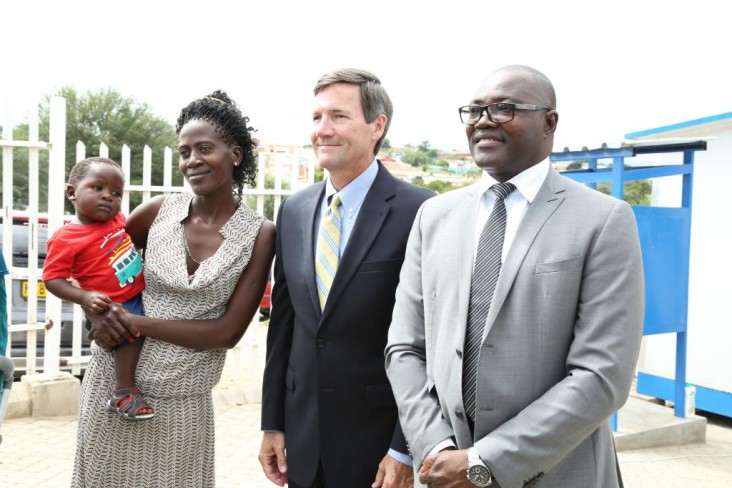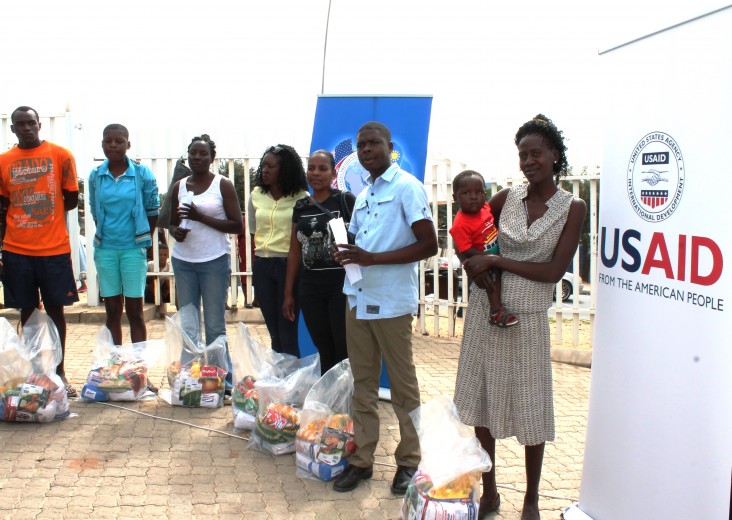
Ministry of Health and Social Services officials from the National Tuberculosis and Leprosy Program, members of the Regional and District office, health staff of this clinic, TB Community Ambassadors, patients, members of the media, ladies and gentlemen. Good morning.
I feel privileged to be here this morning, just two days before World Tuberculosis Day on March 24th. The Okuryangava Clinic is a crucial health site in our combined effort alongside the Namibian government to fight TB and HIV. Since 2015, with the support of the U.S. government through PEPFAR and USAID, some 350 patients have accessed TB treatment and referral services to HIV care, right here at this TB-Directly Observed Treatment center. Some of those patients are here today. Please join me in a round of applause to recognize their efforts and commitment to beating this disease.
This morning, we are gathered to celebrate some impressive milestones achieved in the fight against TB and HIV in Namibia. In the whole Windhoek District, the Challenge TB Project has supported access to comprehensive tuberculosis and HIV services for more than 1,000 people. Countrywide, we have provided these comprehensive services to more than 3,500 people. Every one of those lives is precious, and providing comprehensive care to those who didn’t have care before helps ensure that these people can continue to enjoy full and productive lives. Congratulations to all of you who have been instrumental in reaching these milestones!![]()

Current data show a downward trend in TB cases and an upward trend in TB-treatment success rates. That is, of course, good news. But it is critical to continue to provide comprehensive tuberculosis and HIV services in Namibia, for two reasons. The first reason has to do with treating disease. Effectively treating tuberculosis on its own is possible. Effectively treating HIV in someone who is HIV-positive is also possible. But treating someone who has contracted both HIV and tuberculosis is far more difficult as both diseases in the same patient can become too strong for the patient to fight.
It is also critical to continue to provide comprehensive tuberculosis and HIV services in Namibia because, for reasons we don’t yet fully understand, Namibia has one of the highest HIV – TB co-infection rates in the world. That means that, on average, about 4 out of every 10 patients with tuberculosis are also HIV-positive. Fortunately, thanks to heightened awareness of TB and provision of comprehensive TB and HIV services in Namibia, that proportion has been dropping, but it’s critical that we keep up the effort.
The progress and milestones showcased at this clinic today send a clear message that the UNAIDS 90-90-90 targets are indeed achievable in Namibia. If you doubt that, you should know that in most districts, the levels of HIV testing and antiretroviral treatment initiation in TB patients co-infected with HIV have already exceeded 80 percent.
The U.S. government, through PEPFAR, has established strong collaborative relationships in the health sector over the years. One area that we have long recognized as a key to the health of Namibians is tuberculosis. That’s why USAID has been a strong supporter of the Challenge TB Project – to date, we’ve invested US$3.8 million, or about N$48 million, in the project. That investment is one sign of the U.S. government’s enduring commitment to battling TB and HIV in Namibia.
We all have reasons to be proud of what’s been accomplished. Your commitment and hard work demonstrate that Namibia is on the right track. But, as partners in this fight, we must maintain our focus on fighting these diseases that devastate families and debilitate nations. My government’s support is about saving lives and allowing people to live productive lives. And a Namibia with healthy and productive citizens means a healthy and prosperous Namibia.
I want to applaud all of the patients who have completed their TB treatment, including those we witnessed being discharged today. If all patients who begin treatment take their medicines and complete the treatment course the way you did, ending tuberculosis in Namibia will become a reality.
I am greatly impressed and humbled by the efforts of all of you to end tuberculosis. Thank you once again for your openness and hospitality today. And please, keep up the good work!







Comment
Make a general inquiry or suggest an improvement.